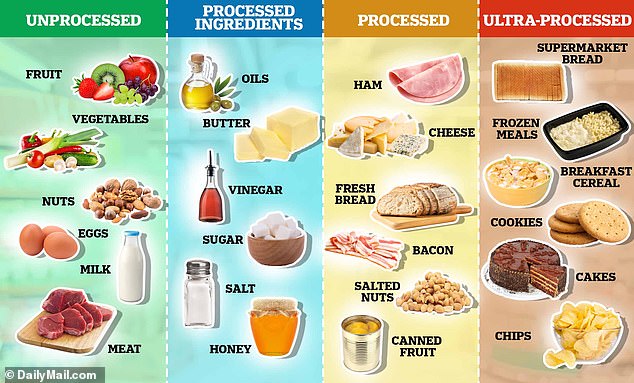Vegetarians eat MORE ultra-processed food than research into meat-eaters suggests – and researchers warn against plant-based milks
Vegetarians eat more ultra-processed foods (UPF) than their meat-eating counterparts, a major British study has found.
Although the diet can be filled with fresh fruits and vegetables, vegetarians can also consume large amounts of UPFs, such as chocolate bars, ready-made meals, frozen pizzas and soft drinks.
A team of experts, led by Imperial College London, surveyed almost 200,000 Britons about their daily average UPF intake and their diet in general.
They found that UPFs made up a fifth of all participants’ diets, but vegetarians were the most likely to rely on them.
Overall, the researchers found that they ate significantly more ultra-processed foods than “regular red meat eaters” – defined in the study as eating red meat more than once a week.
Vegans, despite a diet rich in fruits, vegetables and legumes, were also big UPF consumers, eating as much as the carnivores.
Instead, it was those who ate red meat sporadically and moderately, and pescatarians, who were least likely to rely on UPFs.
The authors said their results also showed an increase in the consumption of plant-based UPF milk and fake meat among plant-conscious vegetarians, vegans and pescatarians, which they called “concerning.”
“UPFs produced purely from plant-based substances are increasingly being promoted by the UPF industry as healthy and sustainable alternatives to mobilize consumers’ transition from a meat-based diet,” they wrote in the journal EClinical Medicine.
Vegetarians eat more ultra-processed foods (UPF) than their more carnivorous counterparts, a large-scale survey of Britons has found. Stock image
‘It is therefore important that urgently needed policies that address food system sustainability also promote the rebalancing of diets towards minimally processed foods, away from UPFs.’
Several experts have highlighted that plant-based milk and fake meat are not the healthy alternatives that consumers would expect, and could even be linked to cardiovascular disease.
The authors of the current study, which also included scientists from France and Brazil, highlighted research suggesting that UPF consumption in general is linked to a host of health problems, including obesity, type 2 diabetes and even cancer and death.
Despite vegans eating as many or more UPFs on average than meat-eaters, the experts noted that their diets were generally healthier with more fiber and lower total calories, saturated fats and salt than other groups.
The authors attributed this to the higher overall consumption of fresh fruit and vegetables.
The study had a number of limitations, including the low number of vegans: only 159.
Experts also noted that the data, collected as part of a long-term study between 2006 and 2010, was based on participants’ recollection of their diet, which is known to be subjective and unreliable.
They also noted that the research group appeared to eat fewer UPFs than the average Briton, with some estimates suggesting that these foods now make up 57 percent of the national diet, the highest proportion in Europe.

UPFs are a staple of the modern British diet and are an umbrella term covering a wide range of foods that are packed with artificial colours, sweeteners and preservatives that extend shelf life.
UPFs include a wide range of foods and drinks packed with artificial colors, sweeteners and preservatives, as well as, typically, calories and sugar.
Examples include ready-made meals, ice cream and even ketchup.
They typically undergo multiple industrial processes that research has shown affect the physical structure of food, causing it to be quickly absorbed.
This, in turn, can increase the risk of spikes and spikes in blood sugar levels, reducing feelings of satiety.
It’s also said to harm the microbiome: the community of “friendly” bacteria that live within us and depend on for good health.
UPFs are believed to be a major cause of obesity, which costs the NHS around £6.5 billion a year.
However, experts have repeatedly urged caution in linking UPF consumption to health problems.
Many consider the term UPF too broad because it considers a whole wheat bread, which has some health benefits, and a ready meal packed with salt, fat and sugar to be the same type of food under the classification system.
Some experts argue that this can make it unclear which UPFs may cause certain health problems.
Researchers have also emphasized that UPFs themselves may not directly cause health problems observed in studies.
Instead, they have suggested that eating a lot of UPFs could be a symptom of other problems, such as poverty, which could reduce people’s intake of fresh fruits and vegetables.
